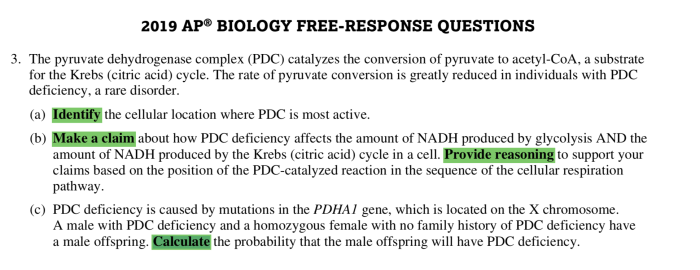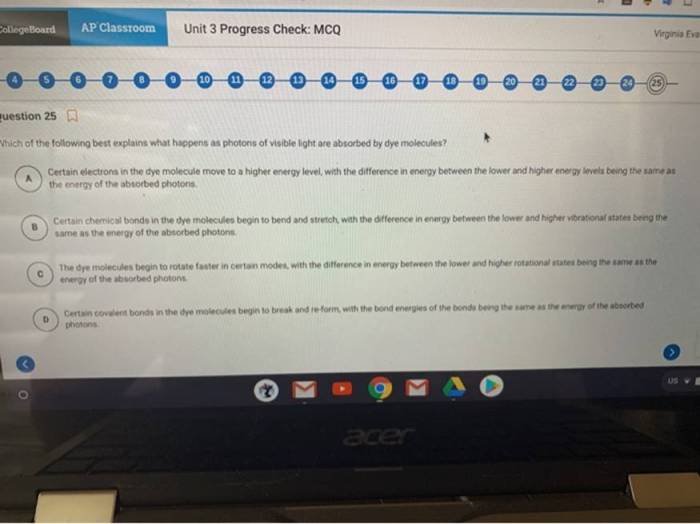Ap bio unit 2 progress check – Prepare for success in AP Biology Unit 2 with our comprehensive progress check guide. This invaluable tool provides a clear understanding of key concepts, assessment formats, and strategies to excel in your studies.
Dive into the core concepts covered in Unit 2, explore the assessment structure, and discover effective preparation methods. With this guide, you’ll gain insights to identify your strengths, address areas for improvement, and create a tailored action plan for academic triumph.
Introduction
The AP Biology Unit 2 Progress Check serves as a crucial assessment tool to evaluate students’ understanding of key concepts covered in the first half of the course.
Assessing student progress is essential for several reasons. It allows teachers to:
Identify Areas for Improvement, Ap bio unit 2 progress check
- Pinpoint specific areas where students are struggling, enabling targeted interventions to address their learning gaps.
Monitor Student Growth
- Track students’ progress over time, identifying areas of improvement and potential challenges.
Provide Feedback
- Offer timely and constructive feedback to students, helping them understand their strengths and areas for growth.
Key Concepts

AP Biology Unit 2 delves into the intricate mechanisms that underpin the diversity of life on Earth, exploring the cellular processes that govern inheritance, variation, and the continuity of life. This unit lays the foundation for understanding the complexities of biological systems and the remarkable adaptations that have shaped the evolution of species.
The core concepts covered in this unit encompass:
- The structure and function of DNA, the genetic material that carries hereditary information.
- The processes of DNA replication, transcription, and translation, which enable the faithful transmission of genetic information from one generation to the next.
- The mechanisms of inheritance, including Mendelian genetics and patterns of inheritance.
- The genetic basis of variation, including mutations, genetic recombination, and natural selection.
- The role of DNA technology in modern biology, including genetic engineering and biotechnology.
Molecular Basis of Inheritance
The molecular basis of inheritance centers around the structure and function of DNA. DNA, a double helix composed of nucleotides, serves as the blueprint for life, carrying the genetic instructions that determine the traits of an organism.
The AP Bio Unit 2 Progress Check is a great way to assess your understanding of the material. If you’re looking for additional resources, check out this APUSH Period 9 Study Guide . It provides a comprehensive overview of the key concepts and events from that period.
After reviewing the study guide, you’ll be well-prepared to tackle the AP Bio Unit 2 Progress Check with confidence.
- The structure of DNA, including the arrangement of nucleotides and the formation of base pairs, is essential for understanding the mechanisms of genetic transmission.
- DNA replication ensures the faithful duplication of genetic information during cell division, ensuring the continuity of genetic material across generations.
Gene Expression
Gene expression encompasses the processes by which the information encoded in DNA is translated into functional products. This intricate process involves multiple steps:
- Transcription involves the synthesis of messenger RNA (mRNA) from a DNA template, carrying the genetic code to the ribosomes.
- Translation occurs on ribosomes, where mRNA is decoded to produce a specific sequence of amino acids, forming a protein.
Inheritance
Inheritance refers to the transmission of genetic traits from parents to offspring. Mendelian genetics, the foundation of classical genetics, provides a framework for understanding patterns of inheritance:
- Gregor Mendel’s laws of segregation and independent assortment explain the inheritance of single genes and the formation of gametes.
- Extensions of Mendelian genetics, such as incomplete dominance and codominance, provide a more comprehensive understanding of inheritance patterns.
Variation
Variation is the cornerstone of evolution, providing the raw material for natural selection to act upon. Genetic variation arises from various sources:
- Mutations, changes in DNA sequences, can introduce new genetic material and drive evolution.
- Genetic recombination, the exchange of genetic material during meiosis, shuffles alleles and increases genetic diversity.
- Natural selection, the differential survival and reproduction of individuals with favorable traits, drives the adaptation of populations to their environment.
DNA Technology
DNA technology has revolutionized modern biology, providing powerful tools for manipulating and analyzing genetic material:
- Genetic engineering techniques, such as recombinant DNA technology, allow scientists to alter and manipulate genetic material for various applications.
- Biotechnology utilizes DNA technology to develop products and processes that improve human health, agriculture, and the environment.
Assessment Format: Ap Bio Unit 2 Progress Check

The AP Biology Unit 2 Progress Check is a multiple-choice assessment designed to evaluate your understanding of the concepts covered in Unit The assessment consists of 30 multiple-choice questions, each worth 1 point. The questions are divided into three sections:
- Multiple Choice: This section contains 20 questions that assess your knowledge of the core concepts and principles of Unit 2.
- Grid-In: This section contains 5 questions that require you to provide a short answer or numerical response. These questions test your ability to apply your knowledge to solve problems or analyze data.
- Free Response: This section contains 5 questions that require you to write a short essay or provide a detailed explanation. These questions assess your ability to synthesize information, analyze data, and communicate your understanding of the material.
The Progress Check is designed to provide you with feedback on your understanding of the material and to help you identify areas where you may need additional support. The assessment is not graded, and your performance will not affect your final grade in the course.
Preparation Strategies

Preparing for the AP Biology Unit 2 Progress Check is crucial for success. Here are some effective strategies to help you excel:
Study Methods
- Review Course Materials:Revisit your notes, textbooks, and online resources to refresh your understanding of key concepts.
- Practice Questions:Engage in practice questions and past exam papers to test your knowledge and identify areas needing improvement.
- Utilize Online Resources:Take advantage of online platforms like Khan Academy and Crash Course for additional study materials and practice questions.
Study Resources
- AP Biology Textbook:Refer to your assigned textbook for comprehensive coverage of the unit’s content.
- Online Simulations and Labs:Utilize virtual labs and simulations to enhance your understanding of complex biological processes.
- Study Groups:Form study groups with classmates to discuss concepts, clarify doubts, and engage in collaborative learning.
Analysis of Results

Interpreting the results of the AP Biology Unit 2 Progress Check is crucial for identifying areas of strength and weakness. The score report provides detailed information about your performance in each section, allowing you to assess your understanding of key concepts and identify areas where further study is needed.
To analyze your results effectively, focus on the following aspects:
Identifying Strengths
- Review the sections where you scored well. This indicates areas where you have a strong understanding of the concepts and can continue to build upon.
- Note the specific questions or topics within these sections that you answered correctly. This will help you pinpoint your areas of proficiency.
Identifying Weaknesses
- Pay attention to the sections where you struggled. These areas indicate topics that require further study and reinforcement.
- Analyze the specific questions or topics that you answered incorrectly. Identify the concepts or skills that you need to improve upon.
- Consider whether the difficulty stemmed from a lack of understanding of the concept, a misunderstanding of the question, or a time management issue.
Action Plan
After analyzing the results of your AP Biology Unit 2 Progress Check, it’s time to develop an action plan to address areas for improvement. This plan should guide your preparation for the actual AP exam.
Start by identifying your strengths and weaknesses. Focus on areas where you need the most improvement, whether it’s understanding key concepts, applying biological principles, or developing analytical skills.
Strategies for Addressing Areas of Improvement
- Review Core Concepts:Revisit the fundamental concepts tested in Unit 2. Use your textbook, notes, and online resources to strengthen your understanding.
- Practice Applying Principles:Solve practice problems, conduct virtual labs, or participate in study groups to apply biological principles to real-world scenarios.
- Develop Analytical Skills:Engage in activities that require you to analyze data, draw conclusions, and make predictions based on scientific evidence.
- Seek Support:Don’t hesitate to reach out to your teacher, tutor, or classmates for clarification or assistance with challenging topics.
- Utilize Study Tools:Create flashcards, use concept maps, or summarize key ideas to enhance your memorization and retention.
- Time Management:Allocate sufficient time for studying and practice, breaking down large tasks into smaller, manageable chunks.
By implementing these strategies, you can effectively address areas of improvement identified in your Progress Check results and enhance your preparation for the AP Biology exam.
FAQs
What is the purpose of the AP Biology Unit 2 Progress Check?
The progress check assesses student understanding of key concepts covered in Unit 2, identifies areas for improvement, and provides guidance for further study.
How do I prepare for the AP Biology Unit 2 Progress Check?
Review course materials, attend class regularly, engage in practice questions, and utilize study resources such as textbooks, online platforms, and study groups.
What types of questions are included in the AP Biology Unit 2 Progress Check?
The assessment includes multiple-choice questions, free-response questions, and data analysis tasks that test students’ understanding of biological concepts, experimental design, and data interpretation.